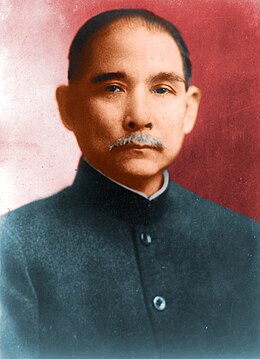The Principle of Mínzú
(Min²-tsu², 民族主義 "The People's Relation/Connection" or "Government of the People"): Nationalism. By this, Sun meant freedom from imperialist domination. To achieve this he believed that China must develop a "civic-nationalism", Zhonghua Minzu, as opposed to an "ethnic-nationalism", so as to unite all of the different ethnicities of China, mainly composed by the five major groups of Han, Mongols, Tibetans, Manchus, and the Muslims, which together are symbolized by the Five Color Flag of the First Republic (1911-1928). This sense of nationalism is different from the idea of "ethnocentrism," which equates to the same meaning of nationalism in Chinese language.
The Principle of Mínquán
(Min²-ch'üan², 民權主義 "The People's Power" or "Government by the People"): Democracy. To Sun, it represented a Western constitutional government. First, he divided political life of his ideal for China into two sets of 'powers':
The power of politics
(政權; zhèngquán): These are the powers of the people to express their political wishes, similar to those vested in the citizenry or the parliaments in other countries, and is represented by the National Assembly. There are four of these powers: election (選舉), recall (罷免), initiative (創制), and referendum (複決). These may be equated to "civil rights".
The power of governance
(治權; zhìquán): these are the powers of administration. Here he expanded the European-American constitutional theory of a three-branch government and a system of checks and balances by incorporating traditional Chinese administrative tradition to create a government of five branches (each of which is called a yuàn or 'court'). The Legislative Yuan, the Executive Yuan, and the Judicial Yuan came from Montesquieuan thought; the Control Yuan and the Examination Yuan came from Chinese tradition. (Note that the Legislative Yuan was first intended as a branch of governance, not strictly equivalent to a national parliament.)
The Principle of Mínshēng
(民生主義; mínshēng): This is sometimes translated as "The People's Welfare/Livelihood," "Government for the People," or even socialism, although the government of Chiang Kai-shek shied away from translating it as such. The concept may be understood as social welfare or as populist ("for the people", "to pleasure the people") governmental measures. Sun understood it as an industrial economy and equality of land holdings for the Chinese peasant farmers. Here he was influenced by the American thinker Henry George (see Georgism); the land value tax in Taiwan is a legacy thereof. He divided livelihood into four areas: food, clothing, housing, and transportation; and planned out how an ideal (Chinese) government can take care of these for its people.




